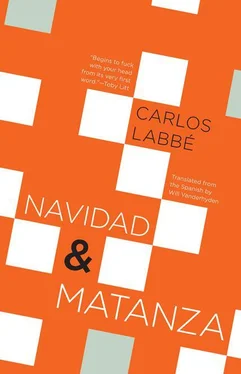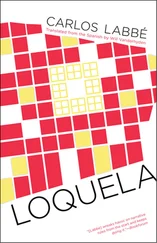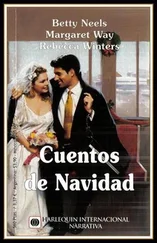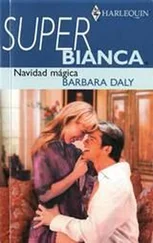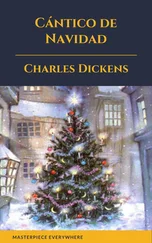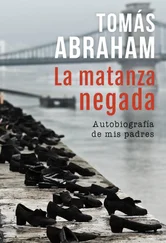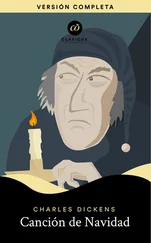I WANT TO TELL you how we imagine the organization’s facilities outside the walls of the six bedrooms, the entertainment room, meeting room, bathrooms, and laboratory where they’ve locked us. Our idea is based on the few things Juan Carlos Montes has told us, and the din we sometimes hear in the night. There’s a bubbling machine at the center of a four-hundred-and-sixty square foot industrial plant, beneath a remote mountain, desert, or glacier in the United States. Thick tubes surround it, running through lead walls that contain the radioactive chemicals. In the center there’s a glass dome where the intangible, glowing substance we call hadón reacts. Everything painted blue and white. Cold bulbs that do not light or flicker. As in our dormitories, a reflective panel covers the surface of the walls, ceilings, and floor. But it’s not a mirror. Everything it reflects forms part of the surveillance record at the Masters Lab. It’s also the medium they use to communicate: sometimes in the morning you might be getting dressed, brushing your teeth, or simply examining your face or your back in the mirror, and your image disappears, like a stone thrown into a pool. The reflection reforms, but now it’s the face of someone else, in some other location, materializing to tell you something.
And so it was this morning. Immediately my reflection transformed into Montes, informing me that we had a very important matter to discuss that afternoon. I speculated that it had to do with the chapters of the novel-game Martes and I had recently written. Montes would ask us to end this diversion. He wouldn’t have been pleased with the story about the girl and the father who swim in the sea while their towels are stolen, because he would have recognized, first the appearances of Edgar Lee Masters and Real (coincidences, he might surmise at first) and then of the hadón and the Vivars, as a rabidly explicit protest on our part against the silencing of Sabado, who’d been locked in her bedroom for more than a month. I feared the worst.
I sat down to wait in one of the meeting room’s translucent chairs. As my eyes followed, on the screen of the table’s central panel, three-dimensional simulations of genetically amnesic mice passively reacting to hadón (before normal mice, also hadonized, devoured them furiously), I entertained myself by planning the disappearance of the journalist, whom I’d succeeded in establishing as the protagonist-narrator confronting the truth of the Vivar case: there was no truth. It was all a farce. Maybe it’d have something to do with some scheme of Boris Real’s to divert suspicion regarding his involvement in the accident at the Vivar’s family pool that took the lives of Juan Carlos Montes’s two children. Maybe it’d simply be related to thoughts Alicia wrote down in the notebook she hid in horror under her bed every time her father tapped softly at her door, coming in to tell her the same story he told every night, Alice in the Underworld ; the same notebook that the journalist would find in the glove compartment of his car on his way back to Santiago, the handwriting so similar to his own that it made him doubt his sanity.
I was lost in these musings when the sliding door blinked open and shut. Juan Carlos Montes, pale and scowling, stood in front of me. He explained that the project had come to an end. He wanted me to know that his father was a great scientist. A specialist, respected equally in the logic and metaphysics of quantum theory, as well as in behavioral predictions given limited variables. So, while we were developing a chemical meant to inhibit all social impulses in mice, Montes’s father was testing how we — seven human beings subjected to a limited routine, limited spatial and temporal freedom, to emotional relations regulated by light, ambient temperature, and the most awful food and music — would respond to his disintegration hypothesis. So he’d let us play at this idiotic email novel, even though we spoke ill of him, believing access to our inboxes to be personal and private. Everyone’s subjectivity would be more compromised in a literary creation than in the work of synthesizing hadón, and it was to their advantage that the course of our aggravation, fear, hate, and inevitable conflict be recorded in the first person. His father was a man of acute perspicacity, he told me. He’d projected a rule of analogous synchrony, predicting that, in the moment Martes, Sabado, and I finally arrived at a form of hadón a human metabolism could tolerate, our relationship would disintegrate, fatally. As an homage to our work, the video of our sojourn in the laboratory would be used by Montes before the OMS commission as proof that, in reality, human beings do not require ad campaigns or drug therapy to feel hate, they possess an instinctive propensity for it. So, the supposed side effects of hadón could only be presumed, never proven.
Nothing that Juan Carlos Montes said surprised me. I listened to him without confusion or hope, like someone reading a book or watching a movie. He told me that now they were going to shut me in a room with Martes until one of us destroyed the other. Whoever was left alive would be allowed to leave with a bank account containing a considerable sum and no memory of the last ten months. Then I asked about Sabado. Montes took a step back and told me that she was no longer in her bedroom, or in any other area of the laboratory. Although it seemed impossible, she’d managed to escape through the air ducts in the bathroom or the entertainment room. It was likely that no one would ever see her again. She’d spend a few days slithering through the underground sewer system of the industrial complex, looking desperately for a way to the surface. But she wouldn’t find one. Sabado would die of starvation or gangrene in the Underworld , Montes said ironically. I could take no more; I stood up loudly from my chair and jumped on him, spitting. I remember stomping on his head until his face was paler than before. My foot looked like a boot of blood.
I went to the entertainment room and sat down at my computer. I checked my email. There was a laconic but affectionate message from Sabado. She’d sent it in the last five minutes from a coffee house in downtown Salt Lake City. She said she was safe. That she knew that today they’d add doses of hadón, experimentally processed for human beings, to our food. She also attached one of the final episodes of the novel-game, which I’ll send to you later.
Martes just came in. He’s sweating and looking at me as if he doesn’t trust, as if he doesn’t trust me, or something around me. I should go. The door just locked from the outside, I fear permanently.
MORE THAN JUST A family, it doesn’t seem presumptuous to state that the Vivars were a group of people bound together by an enduring perplexity, by having in common something more than possessive impulses. The magazine articles that appeared in the months following Bruno and Alicia’s disappearance — the first of which I wrote myself ( Revista SEA , n° 327, February 24 th, 1999) — had nothing to do with reality.
Photographs of the family smiling and embracing each other in the warmth of their home were only part of the media campaign orchestrated by Teresa Elena Virditti. It was no coincidence that, following the disappearance of his two children, Juan Francisco Vivar shut himself away in his mansion. I’m talking about pathological individuals; six twisted people taking part in an unpredictable game.
The article in SEA , contrary to what the date of publication indicates, wasn’t written in response to the events in Navidad and Matanza, nor did the photograph depicting the Vivars necessarily come from the Vivar Family Archive, as the caption states. In the last days of December — less than a month before Bruno and Alicia disappeared — the journal’s photographer and I received instructions to “write a human interest piece” on the family of renowned businessman Jose Francisco Vivar. As usual, with a roll of our eyes, we obeyed; in the end our salaries, like all the funds at the journal, came from these people, and they were committed to maintaining an image of homespun happiness. And really it wasn’t at all surprising since the fastidious Teresa Elena Virditti (with her unforgettable opera goer hairstyle) was, at the time, on SEA ’s editorial committee. Only after being in that house and hearing the news of the disappearance of those two children — which didn’t surprise me — can I explain the shudder I experience when I read that the Chilean family is the moral foundation of our country’s ruling class.
Читать дальше
